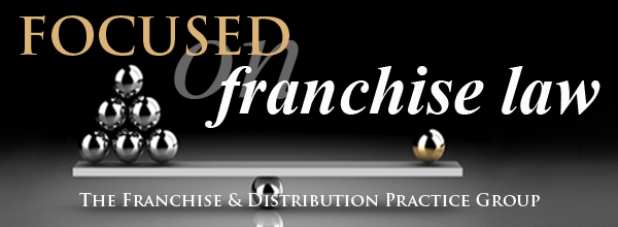Franchise 101: State Taxes on Franchise Fees; and Breach of Contract Claims

bkurtz@lewitthackman.com
dgurnick@lewitthackman.com
tgrinblat@lewitthackman.com
swolf@lewitthackman.com
msoroky@lewitthackman.com
kwallman@lewitthackman.com
tvernon@lewitthackman.com
May 2017
New Rules re Financial Performance Representations
Tal Grinblat, a member of the Executive Committee of the Business Law Section of the State Bar of California, co-wrote a notice distributed to state bar members regarding new guidelines franchisors must follow when using financial performance representations (FPRs). The new guidelines impact all franchisors in the U.S. and its territories. The e-bulletin alerts those in the industry about the North American Securities Administrators Association’s (NASAA) adoption of financial performance guidelines which require a number of new disclosures and a certain admonition. The guidelines also set requirements for franchisors using “averages” or “medians” in their FPRs.
Read the e-Bulletin: NASAA Issues New Commentary on Financial Performance Representations in Franchise Disclosure Documents
FRANCHISOR 101:
State Taxes on Franchise Fees

 Franchisors collect weekly or monthly “franchise fees.” In many cases, fees are for particular services, such as marketing assistance or IT support. In franchising, the parties may be in any number of different states: for example, a franchisor may be headquartered in California, provide IT support from Texas to a franchisee in Florida, and receive payments at an office in Washington. Which states may tax the franchisor on franchise fees, and in what proportion?
Franchisors collect weekly or monthly “franchise fees.” In many cases, fees are for particular services, such as marketing assistance or IT support. In franchising, the parties may be in any number of different states: for example, a franchisor may be headquartered in California, provide IT support from Texas to a franchisee in Florida, and receive payments at an office in Washington. Which states may tax the franchisor on franchise fees, and in what proportion?
In Upper Moreland Township. v. 7-Eleven, the convenience store franchisor provided advertising services (store signage development) and information technology services to franchisees. Advertising services were provided from Texas. Information technology services were provided from Massachusetts. Franchisees in Pennsylvania and New England sent their payments to a 7-Eleven regional office in a Pennsylvania town where 7-Eleven also had one corporate store and one franchisee-owned store.
The town imposed “Business Privilege Taxes” (BPTs) at a rate of 3.5 mills on gross receipts of “[e]very person engaging in a business … in the Township.” 7-Eleven paid the tax on activities of its corporate store in the town, but not on fees collected at that office from franchisees. After an audit, the town assessed 7-Eleven over a million dollars for unpaid BPTs, interest, and penalties.
7-Eleven challenged the constitutionality of the assessment. A Pennsylvania court relied on a 1970s- era U.S. Supreme Court decision, Complete Auto Transit, Inc. v. Brady (1977), to determine if a local tax on interstate commerce is constitutionally permissible. To be “fairly apportioned,” as Brady requires, the local tax must be “externally consistent.” To be externally consistent, a tax must apply to “only that ‘portion of the revenues from the interstate activity which reasonably reflects the instate component of the activity being taxed.'” A tax does not meet this standard if the amount of income taxed is “disproportionate to the business transacted by the taxpayer in that municipality.”
Applying the Brady rule, the Pennsylvania court found the town’s assessment was unconstitutional because it was not fairly apportioned to reflect the location of the various interstate activities that generated the 7-Eleven service charges. 7-Eleven just received payments in the town, but the rest of the activities occurred elsewhere. The court remanded the case to the town for a “constitutional recalculation of the assessment.”
A franchisor may consider using constitutional limits on local tax powers to protest some municipal taxes. It may also be useful to identify as many components of its interstate commerce activity as it can in locales with lower tax rates.
Read: Upper Moreland Twp. v. 7 Eleven, Inc. 144 CD 2016, before the Pennsylvania Commonwealth Court
FRANCHISEE 101:
Contract Curveballs

In every Franchise Agreement, the franchisor and franchisee promise to fulfill obligations to the other. For some promises, whether or not they were performed can be a clear “yes” or “no.” For example: either a franchisee paid the royalty to the franchisor on the specified date of the month, or it did not – there is usually no third option. However, other obligations – such as a franchisor’s promise to provide the franchisee with “support” – may be vague. How much assistance and what kind of help a Franchisor must provide may not be clear. These are judgment calls that may ultimately be presented to a jury as questions to decide at trial.
In Anne Armstrong v. Curves International, Inc., franchisees owning 83 locations sued Curves International, the franchisor of 30-minute women’s gyms, after suffering losses in their Curves businesses. The franchisees claimed their losses were due to Curves not giving them support promised in their franchise agreements. The agreements said Curves would “make available certain services,” followed by a list of services that “may” be included, such as opening assistance, pre-opening training, periodic reviews of franchisee operations, periodic training, ongoing support, and advertising data and advice. The franchisees claimed they generally did not receive any of the promised assistance.
As evidence of their losses, the franchisees provided tax returns, and a statement by Curves’ founder that Curves felt “a reasonable return on the franchise was probably $30,000 a year,” though no level of profit was guaranteed by the agreements.
Curves moved to dismiss the claims, arguing that the agreements stated only that Curves “may” provide the listed services. Curves also argued that clauses allowing it to exercise “business judgment” gave it “unquestionable discretion” regarding support it provided, as long as its decisions were intended to or could benefit the entire Curves system. Curves presented evidence that it provided franchisees with local marketing materials, and informed franchisees of other advertising initiatives Curves was pursuing.
A jury found that Curves breached its contracts, and awarded the franchisees more than $1.5 million. This included individual plaintiff awards ranging from $0 to $143,928. Counsel for the franchisees stated that the franchisees were pleased with the award, which they calculated to have compensated them for approximately 80 percent of their losses. Curves stated that it strongly disagreed with the decision and plans to file post-trial motions and potentially appeal the verdict.
Had Curves been able to point to text in the agreements literally stating it had no obligation to provide certain services, or that it actually had “unquestionable discretion” to decide what support to provide to franchisees, the outcome may have been different. As it was, the jury had to decide if franchisees received the reasonable support they paid for.
